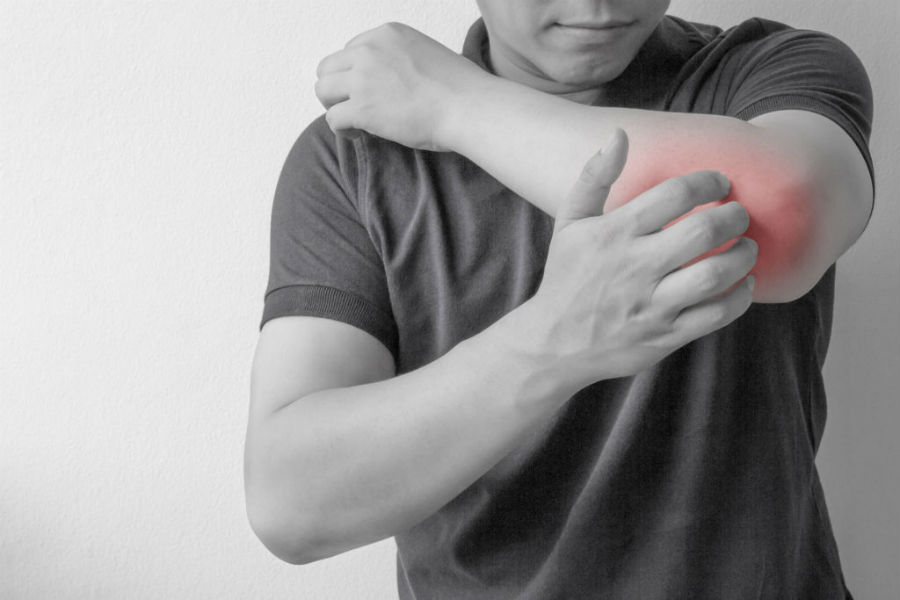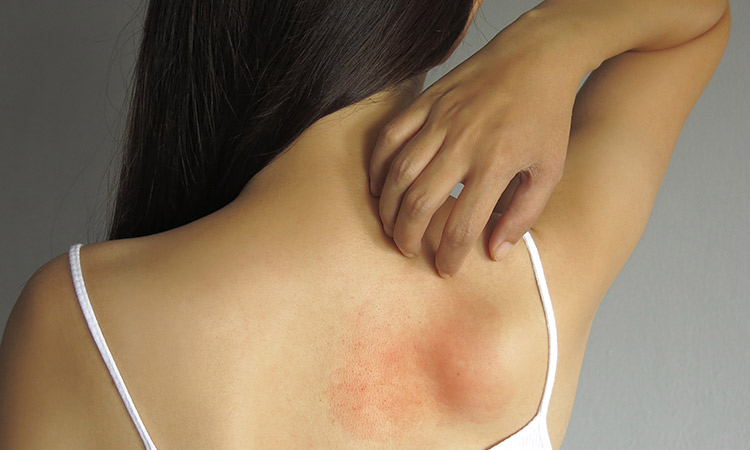Living with psoriasis involves not only treating the condition but also managing the disorder.

Psoriasis Triggers
WHAT IS PSORIASIS?
There are several ways of treating psoriasis, which include topical and oral medication as well as avoiding various medications, foods, and behaviours that can trigger a flare-up. For many people with the skin disorder, being aware of these triggers can help limit the impact this skin disease has on their life and is an important part of managing their condition.
Top Five Triggers:
1. Stress
Stress is widely acknowledged to be the number one trigger for a psoriasis outbreak. It can also cause a person to have an outbreak of psoriasis for the very first time. While avoiding stress entirely is virtually impossible finding ways to manage their stress can help avoid a flare. Some strategies to reduce stress might include meditation, exercise, yoga, behavioural therapy, attending a support group or even as drastic as changing their job.

2. Medication
Certain medications have been linked to psoriasis flares, but it is very important to remember that these drugs are often key to treating a person’s medical condition and if stopped taking, it could impact their health.
A person on such medication should ALWAYS seek medical advice from a doctor or dermatologist who will be able to advise on whether a medication may be causing a psoriasis flare and possibly suggest alternative medication.
3. Skin Damage & Injury
Skin that has received a trauma can lead to a psoriasis outbreak. Such traumas can be minimal and include cuts, bruises, scratches, a vaccination and even sunburn.
4. Infection
Psoriasis is an autoimmune disorder that impacts many systems of the body. As infections affect the immune system these can sometimes lead to a psoriasis flare. Common examples strep throat, bronchitis, ear infections, tonsillitis and respiratory infections.
5. Weather
A change in the type of weather or temperature can be a big trigger of psoriasis for many people. The Winter season can be a difficult time for many psoriasis sufferers when the cold and dry air can irritate the skin. Frustratingly where warm weather and sun exposure can help a persons psoriasis it can also lead to outbreaks in other people. It really is the skin condition with no set rules.

WHILE ITS NOT ALWAYS POSSIBLE TO AVOID EVERY
TRIGGER FOR PSORIASIS, A LITTLE PLANNING CAN GO ALONG WAY TOWARD PREVENTING AN OUTBREAK
Other Possible Triggers
Many people with psoriasis have identified a possible connection between certain lifestyle habits. However, doctors and scientists have not yet medically proven a link between these behaviours and psoriasis. These include,
* Smoking
* Alcohol
* Weight Gain
* Diet
* Hormonal Changes
* Tattoo’s and Piercings

Identifying and Avoiding Triggers
Triggers connected to psoriasis are different for every person. What trigger’s a flare up in one sufferer does not effect another, and triggers can even change for a person over time. That is what makes it such a difficult and frustrating condition. Many of the triggers of psoriasis though can be avoided.
Trying to avoid injuries and protecting skin in cold or dry weather may help some people to avoid a psoriasis flare.
Quitting smoking and reducing alcohol intake will have a positive impact on a person’s health, as well as potentially reducing their psoriasis symptoms. Reducing stress where possible may also help reduce symptoms.
Although diet may reduce symptoms for some people, there is no clear link between certain foods and psoriasis. Even if making dietary changes has a positive impact, it is still important to seek treatment for psoriasis symptoms.
A person who has recently had a diagnosis of psoriasis may be unsure of their individual triggers. Keeping a note of any flares, and trying to spot a pattern of the triggers can help.
Once a person knows what their flare triggers are, it becomes easier for them to avoid these, and to reduce the number of psoriasis flares they experience.
Some triggers link to a person’s overall health. Those who are overweight, regularly drink alcohol, or smoke may have more frequent or severe psoriasis flares than others.
Other triggers may not have a clear scientific link to flares, but people with psoriasis report that they cause flares, such as changes in temperature, weather, and diet.
PSORIASIS IS DIFFERENT FOR EVERYONE. IF YOU
KNOW YOUR TRIGGERS FREQUENT FLARE UPS CAN BE MINIMISED OR TOTALY AVOIDED
